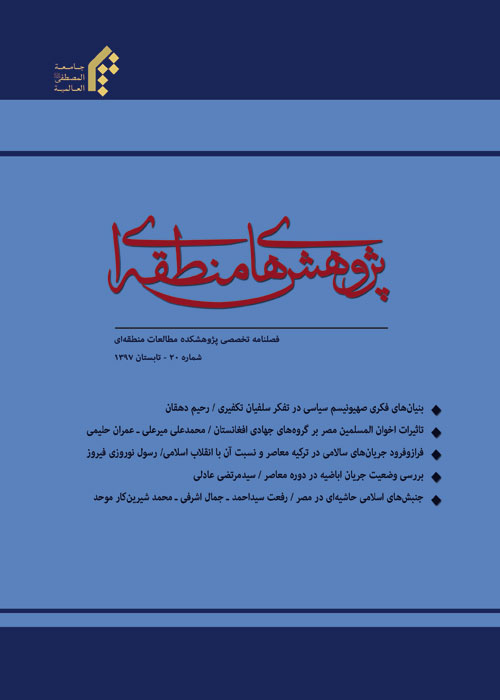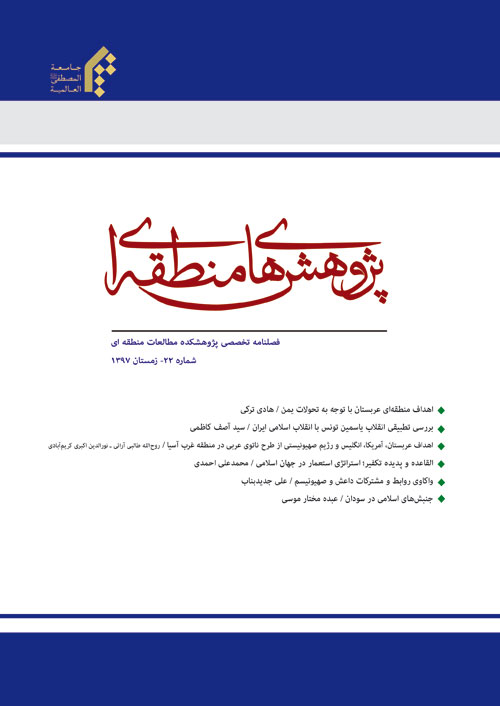فهرست مطالب

فصلنامه پژوهش های منطقه ای
سال ششم شماره 20 (تابستان 1397)
- بهای روی جلد: 100,000ريال
- تاریخ انتشار: 1397/08/20
- تعداد عناوین: 5
-
صفحات 7-23با تحقیق و تامل در رفتار و اندیشه های سلفیان تکفیری می توان دریافت که بنیان هایی یهودی در تفکر آنها وجود دارد. این بنیان ها، خواسته یا ناخواسته هویت تکفیری ها را تغییر داده و آنها را به ابزاری جهت ترویج و تحقق اهداف صهیونیسم سیاسی برخاسته از یهودیت، مبدل ساخته است. این ادعا را می توان با تبیین مبانی فکری دو جریان سلفیان تکفیری و صهیونیسم سیاسی و نیز بررسی ایده های مشترک آنها از جمله حربه تکفیر، برگزیدگی، ترور، خونریزی و...، و نیز از طریق تحلیل نقش سیاسی یهودیت صهیونیسم در ترویج و حمایت از تکفیری ها به اثبات رساند. بررسی بنیان های فکری یهودیت صهیونیسم و رد پای این تفکر در اندیشه سلفیان تکفیری، موید استفاده ابزاری صهیونیسم از سلفیان تکفیری، جهت تبلیغ یهودیت و نیز براندازی تفکر اسلامی و بخصوص شیعی است. این مقاله ضمن تبیین مولفه های مهم در تفکر سلفیان تکفیری می کوشد تصویر روشنی از این بنیان ها ارائه نموده، ضمن بیان همسانی های این دو جریان، نقش صهیونیسم یهودی در حمایت از سلفیان تکفیری و بهکارگیری تکفیری ها در جهت تحقق اهداف صهیونیسم سیاسی را نشان دهد. روش این مقاله در مراجعه به آرا، استنادی و در تبیین محتوا، تحلیلی- انتقادی است.کلیدواژگان: سلفیان، تکفیر، برگزیدگی، یهودیت، صهیونیسم سیاسی، ترور
-
صفحات 25-54نوشته ی حاضر در پاسخ به این پرسش سامان داده شده است که جنبش اخوان المسلمین مصر چه تاثیراتی بر گروه های جهادی افغانی داشته است؟ مطالعه ی این مسئله از آن رو اهمیت دارد که بسیاری از معضلات سیاسی و اجتماعی در افغانستان در روابط و مناسبات نیروهای اجتماعی با جریان های بیرون از مرزها ریشه دارد. برای یافتن پاسخ این پرسش از روش توصیفی تحلیلی بهره برده ایم. نتایج بهدستآمده حاکی از آن است که گروه های جهادی، در اهداف و آرمان ها، تشکیلات سازمانی و شیوه های مبارزاتی خود از اخوان المسلمین تاثیر پذیرفته و شش عامل در تاثیرگذاری اخوان بر این گروه ها نقشی اساسی داشته اند: موقعیت محوری مصر و الازهر در جهان اسلام، نوگرایی رهبران اخوان در تفسیر آموزه های دینی، ایدئولوژی سیاسی جذاب اخوان، قرابت دینی و مذهبی مصر با جامعه ی اهل سنت افغانی، فقر فکری فرهنگی در افغانستان و حمایت غربی ها از اندیشه های اسلام گرایانه در برابر توسعه ی نفوذ سوسیالیزم. تفکرات اخوانی از طریق تحصیلکردگان مذهبی، نیروهای اعزامی عرب و ترجمه ی کتاب ها و مجلات به افغانستان منتقل شده و به صورت مشخص سه گروه جنبش جوانان مسلمان، حزب اسلامی گلبدین و جمعیت اسلامی را تحت تاثیر قرار داده است. گسترش افراط گرایی و تعمیق شکاف های اجتماعی در افغانستان را می توان دو پیامد مهم تاثیرپذیری گروه های جهادی از اخوانالمسلمین دانست.کلیدواژگان: گروه های جهادی، تاثیرپذیری، افغانستان، اخوان المسلمین، افراط گرایی، شکاف های اجتماعی
-
صفحات 55-82ترکیه از جمله کشورهایی است که امروزه داعیهدار الگوی تمدنی برای جهان اسلام است. تحولات چنددهه اخیر ترکیه نشان از رشد اسلامگرایی به همراه رشد اقتصادی و سیاسی در سطح منطقهای و بینالمللی میدهد. این تحولات برایند رقابت میان جریانها و جنبشهای موجود در فضای فکری ترکیه با قرائتهای خاص خود از اسلام، مدرنیته و ملیگرایی میباشد. شناخت این جریانها و جنبشهای فکری میتواند در تحلیل روندها و رویکردهای آتی کشور ترکیه در سطح منطقهای و بینالمللی کارآمد باشد. در این مقاله تلاش میشود ضمن بررسی اجمالی فراز و فرود جریانهای اسلامگرای ترکیه، خاستگاه هر یک از آنها و ارتباط آنها با انقلاب اسلامی یا نقش آنها در تغییر جایگاه انقلاب اسلامی در فضای فکری ترکیه تبیین شود.کلیدواژگان: ترکیه، کمالیسم، اسلامگرایی، جریانهای اسلامی، اسلامگرایان سیاسی، اسلامگرایان میانهرو، انقلاب اسلامی ایران
-
صفحات 83-116اباضیه از جریان های کلامی انشعاب یافته از خوارج است که تا عصر حاضر در جهان اسلام ظهور و بروز داشته و از نظر کلامی و فقهی، جریانی مستقل به شمار می رود. در دوره ی معاصر وضعیت این جریان فکری در ابعاد مختلف بر بسیاری پوشیده است و غالبا شناخت ها دراینباره مبتنی بر کتاب های کلامی کهن بوده که بهجز در مواردی، از ارزش چندانی برخوردار نیست. نوشتار حاضر می کوشد با کاوش در منابع جدید و معاصر اباضی، اعم از مکتوبات و رسانه های مجازی مربوط به اباضیان، دورنمایی از اوضاع عقیدتی، اجتماعی، فرهنگی، سیاسی و جغرافیایی همچنین رابطه ی آنها با مذاهب دیگر را تصویر نماید. اباضیه به عنوان نسخه ی اعتدال یافته ی خوارج، در بسیاری مسائل عقیدتی و سیاسی، رویکردی عقلانی تر و متفاوت با خوارج نخستین اختیار نموده اند. اباضیان که امروزه بیشتر در کشور عمان و نیز شمال و شرق افریقا حضور دارند، افزون بر بهره گیری از رسانه های نوین چون اینترنت و داشتن نظام ترویج اندیشه «العزابه» در شمال افریقا، فعالیت های اجتماعی، تبلیغی و سیاسی قابل توجهی در این مناطق، بهویژه در عمان داشته و با دیگرمسلمانان، اعم از شیعه و سنی تعامل مناسبی دارند. جریان کلامی اباضیه را هم می توان به دو جریان عمان و الجزائر تقسیم کرد که دومین گروه، گرایش های سلفی دارد.کلیدواژگان: اباضیه، خوارج، عمان، العزابه، اهل بیت، شیعه، اهل سنت
-
صفحات 117-129
-
Pages 7-23By studying the Salafi’s behavior and Thoughts, one can find that there are Jewish foundations in their thinking. These foundations, whether intentionally or not, transformed the identity of Takfiris and made them an instrument for promotting the goals of Zionism. This claim can be approved by explaining the intellectual foundations of both the Takfiri Salafi and political Zionist movements, as well as examining their common ideas, including Takfir, discrimination, assassination, bleeding ..., and also by analyzing the political role of Zionist Judaism in supporting Takfir movement. Studying the intellectual foundations of Zionist Judaism and its effect on Takfiri’s Thoughts confirms that political Zionist used Salafis movement to promote Judaism, as well as overthrowing Islamic thought and Shiite in particular. This paper, by explaining the important components in Salafi’s Thoughts, has presented a clear picture of these foundations showing the role of Jewish Zionism in using Salafi’s Thoughts to achieve its goals. The method of this article is referential by analyzing content.Keywords: Salafi, Takfir, discrimination, Judaism, Political Zionism, assassination
-
Pages 25-54The present paper is organized to answer this question of how the Egyptian Muslim Brotherhood movement has had an impact on Afghan jihadist groups? The study of this issue is important because many of the political and social problems in Afghanistan are rooted in the friendships and relationships of social forces with flows outside the borders. To find the answer to this question, we use an analytical descriptive method. The obtained results indicate that the jihadist groups influenced the Muslim Brotherhood in their goals and ideals, organizational structure, and methods of struggle, and six factors influencing these groups had a significant role in the influence of the Brotherhood: The central position of Egypt and al-Azhar in the Muslim world, the modernization of the Brotherhood leaders in interpreting religious teachings, the absorbent political ideology of the Brotherhood, the devout and religious affiliation of Egypt with the Afghan sunni community, the cultural intellectual poverty in Afghanistan, and Western support for Islamist ideas against Development of the influence of socialism. The Brotherhood's thoughts have been transmitted through religious scholars, Arab expeditionary forces, and the translation of books and magazines into Afghanistan, and specifically affected the three groups of the Muslim youth movement, the Gulbuddin Islamic Party, and the Islamic populace. The spread of extremism and the deepening of social gaps in Afghanistan can be seen as two important consequences of the jihadist groups’ influence of the Muslim Brotherhood.Keywords: Jihadist Groups, Influence, Afghanistan, Muslim Brotherhood, Extremism, Social Gaps
-
The ups and downs of Islamic flows in contemporary Turkey and its relation to the Islamic RevolutionPages 55-82Turkey is one of the countries that today claims to be a civilization model for the Islamic world. Developments over the past few decades in Turkey show the rise of Islamism, along with economic and political growth at the regional and international levels. These developments are the result of rivalry between the currents and movements in the Turkish intellectual space with its specific readings of Islam, modernity, and nationalism. Recognition these flows and intellectual movements can be effective in analyzing the future trends and approaches of Turkey at the regional and international levels. In this article, it is trying along with an overview of the ups and downs of the Islamist currents in Turkey, to explain the origins of each of them and their relationship with the Islamic revolution or their role in changing the position of the Islamic revolution in the Turkish intellectual space.Keywords: Turkey, Kemalism, Islamism, Islamic Flows, Political Islamists, Moderate Islamists, Islamic revolution of Iran
-
Pages 83-116Ibadayeh is one of the verbal currents of the Khawarij, which is attributed to Abdullah bin Ibad and Jaber ibn Zayed al-Azdi, which appeared in the Islamic world until the present time and is considered an independent school by theological and jurisprudence. In the contemporary era, the condition of this intellectual process has been covered in many aspects by many people, and most of the knowledge of this subject is based on ancient verbal books, except in some cases, there is little value in this regard. The present article seeks to illustrate the perspectives of ideological, social, cultural, political, and geographic situations, and also their relationship with other religions by exploring new and contemporary sources of Abbasid, including written and virtual media about Abbasid. As a moderate version of Khawarij, Ibadayeh has taken a more rational and different approach to the first Khawarij, in a number of political and ideological matters. Those who nowadays are more in Oman, and in North and East Africa too, in addition to using new media such as the Internet and having a system promoting the idea of "al-Azbah" in North Africa, have significant social, promotional, and political activities, especially in the Omani kingdom, and in the present time they have a good interaction with other Muslims, such as Shi'a and Sunnis. Verbal flow of Ibadayeh can also be divided into two streams of Oman and Algeria, which latter second group has Salafi tendencies.Keywords: Ibadayeh, Khawarij, Oman, al-Azbah, Ahlul Bayt (peace be upon him), Shia


